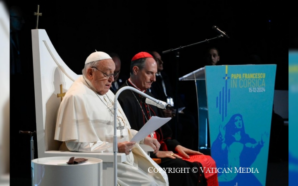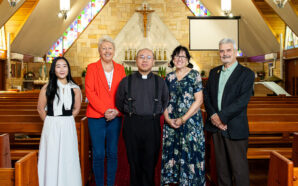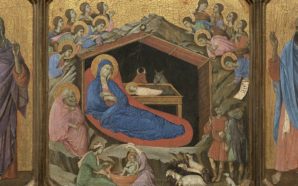Most Reverend Vincent Long Van Nguyen OFM Conv DD STL, Bishop of Parramatta
Homily for the 31st Sunday in Ordinary Time, Year B
Readings: Deuteronomy 6:2-6; Hebrews 7:23-28; Mark 12:28-34
Called to new and higher levels of justice, inclusion, and participation
Dear friends,
After a month of discussions, the second assembly of the Synod of Bishops on synodality concluded its work on October 26 in Rome. The final report which was approved by Pope Francis recommended an attitude of openness and willingness to explore new possibilities. One of the contentious issues was women’s access to ministry and leadership. The document states: “By virtue of Baptism, women and men have equal dignity as members of the People of God. However, women continue to encounter obstacles in obtaining a fuller recognition of their charisms, vocation, and roles in all the various areas of the Church’s life.” It goes on to say that “There is no reason or impediment that should prevent women from carrying out leadership roles in the church: what comes from the Holy Spirit cannot be stopped.”
As true believers, we cannot remain content with status quo, especially when that status quo is less than what God wants for us as individuals and as a community. The Christian movement would have been an irrelevant Jewish sect if it had responded to the questions of their times with fear and timidity. 50 years ago, Martin Luther King Jr lamented that the Christian churches were largely adjusted to the status quo, standing as a tail-light behind other community agencies rather than a headlight leading people to higher levels of justice. We owe it to the prophetic spirit of our forebears in faith in catalysing humanity to greater justice, inclusion, and emancipation.
The Word of God this Sunday speaks to us about the importance of being such a community. God in Christ summons us to live and relate to all things around us in a way that reflects the divine communion of life and love.
In the first reading, we hear how the children of Israel receive instructions as to how they should live and behave towards each other. After the painful but liberating journey out of Egypt, Moses reminds the Israelites that they must be true to the God of freedom and liberation. The whole purpose of the Exodus is to be free from slavery and oppression. It is to be able to live as God’s people.
Moses solemnly exhorts the people “keep all the laws and commandments” as they are about to abandon the nomadic way of life and settle in the promised land. They are to set themselves apart from the other nations. This new society would be marked by worship of the God of love, justice and compassion. “Listen, Israel: The Lord our God is the one Lord. You shall love the Lord your God with all your heart, with all your soul, with all your strength.” These words of Moses to the people have become the traditional Jewish daily prayer called the Shema. It reinforces their commitment to make God and his concern the centre of their life.
This is also fundamentally the message of Jesus. In the Gospel reading, he summarises all the laws and commandments into the supreme and overarching command of love. He reiterates the Shema, that is, the command to love God with one’s whole being, but then immediately couples it with the command to love one’s neighbour as oneself. The two are bound together in a way that one gives shape and expression to the other.
Throughout Jesus’ ministry, we can see the way he expanded the idea of a neighbour to include not only the comrade member of the covenant community but also those who are considered outsiders and those who are seen as the ultimate “other”. In his embrace of the most vulnerable, despised and hated, Jesus presented a whole new way of seeing, acting and relating. He embodied the God who loves without limits and empowers wounded humanity for a life of grace and dignity. When we survey Jesus’ interactions with the people, those who showed great faith, openness, and receptivity to him were not always the standard bearers, not always those who were of his race, religion, or even kindred. Instead, we found to our surprise, they were the unlikely characters: the lepers, the beggars, the foreigners, the tax collectors, even prostitutes and sinners.
Dear friends,
We are called to infuse the world with the kingdom vision of Jesus and to follow his lead in expanding the meaning of loving God and neighbour. We are called to embody in our Church the God revealed as breaking new grounds of inclusion, freedom, participation, and mission.
The kingdom vision of Jesus guides us as we endeavour to be a collective witness against the politics of fear and the economy of exclusion. May we enact this vision individually and as a Body of Christ by lives built on love, pivoted to justice and animated by mercy. Then, we too may hear the words of Jesus to the scribe “You are not far from the kingdom of God.”








